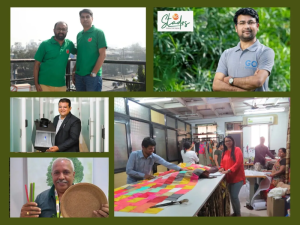An underlying theme of sustainable businesses is innovation – through either a product, service or a combination of both. Here are five environmental entrepreneurs saving the environment and promoting sustainability through their startups.

Photo Courtesy : 30 Stades
Many entrepreneurs today are setting up sustainable businesses that solve environmental problems and still make money because that’s the only way to keep any enterprise going.
An underlying theme of sustainable businesses is innovation – through either a product or a service or a combination of both. Environmental entrepreneurs solve the pressing problem of saving the environment and aiding ecological balance.
Here are five entrepreneurs who are contributing immensely to the cause of the environment through their unique products:
1. Nitin Sharma, Go Waterless, Pune
Water scarcity left Nitin’s family car wash business high and dry in 2016. After the problem continued well into 2017, Nitin began to research products that could wash cars without water.
Finally, in 2019, he developed eco-friendly high-lubricity sprays that clean car interiors and exteriors without water. Go Waterless has been profitable since its inception in 2019 and is present in 22 states.
More importantly, it is saving 12 lakh liters of water daily and earning Rs 2.5 crore in annual revenues.
2. Ashvin Patil and Chaitanya Korgaonkar, Biofuels Junction, Mumbai
Ashvin is an MBA and engineer who quit his job as an equity market analyst to set up Biofuels with his friend Chaitanya.
The duo started Biofuels in 2018 with the dual aim of solving farmers’ problem of agri waste disposal and providing clean fuel to enterprises. Most farmers, after harvest, burn residues like rice stubble, cotton stalks, and coconut husks, causing pollution.
Biofuels procures agri waste from farmers and it is then processed into solid biofuels at the nearest manufacturing facility in the startup’s network. The company’s field staff monitors the quality and consistency of biofuels, which replace coal, diesel and furnace oil at industrial plants, reducing the burden on non-renewable resources.
The sustainable startup works with 25,000 farmers and over 100 top companies. In just four years of launch, it is clocking Rs67 crore in annual revenues.
3. Amit Doshi, NeeRain, Ahmedabad
When Amit Doshi was in class four, he and his brother would accompany their mother to fill water from a tap near their house in Kalol, about 35km from Ahmedabad in Gujarat. The area’s borewells had dried up and the municipality supplied water every three days.
Growing up with water scarcity instilled in Amit a sense of purpose – to save every drop of water. One way to do it was through rainwater harvesting by collecting and storing rainwater that runs off from rooftops, roads, grounds, etc.
After a year of research and development, he designed an instrument to help people collect rainwater, which could be used to recharge borewells or stored, and named it NeeRain Rainwater Filter. This small filter unit with dimensions of 1x1x1.5 feet uses an engineering material called ABS (Acrylonitrile Butadiene Styrene), and it was patented in 2018. Amit’s startup earns Rs 2 crore in revenues annually and is growing rapidly.
4. Vinayakumar Balakrishnan: Thooshan, Kochi
Having spent a large part of his life working in leadership roles in the banking and insurance sector, Vinayakumar decided to return from Dubai to India in 2013 and began research on food waste that could be used to make biodegradable plates.
He approached the Council of Scientific & Industrial Research (CSIR)’s National Institute for Interdisciplinary Science and Technology (NIIST) in Thiruvananthapuram and funded the research on making biodegradable food plates from rice bran. Once the technology was in place, he set up a fully integrated robotic plant in Kochi to make biodegradable cutlery and Thooshan went live in 2021.
According to estimates, producing just one pound of plastic cutlery can take up to 78 liters of water and release 2.5 lbs (1.1 kg) of carbon dioxide. This plastic is difficult to recycle and ends up choking animals and polluting water bodies and soil.
Thooshan cutlery can be decomposed into organic manure or can be used as cattle feed, fish feed, or poultry feed. The startup is sustainable and environment-friendly.
5. Bhavini Parikh, Bunko Junko, Mumbai
In 2016, while working on her garment manufacturing business, Bhavini came across research that textile waste is the third largest source of municipal solid waste in India. With landfills having a limited capacity to take on the load, she decided to minimize fabric waste at her level.
“I realized I was also hurting the environment by being part of the fashion industry. So I thought of up-cycling fabric scraps produced in my garment manufacturing unit,” she says.
Today, her ethical fashion brand Bunko Junko turns textile scrap into stylish clothing, home furnishings, and accessories. Since 2018, it has saved 38 tonnes of fabric from going to landfills and empowered thousands of women. And her profitable operations clock Rs. 40 lakh in revenues annually.
Neerain is proud to republish this blog to spread awareness about the situation of water, for our stakeholders. Credit whatsoever goes to the Author.
This blog is published by: 30 Stades
We would like to spread this for the benefit of fellow Indians.
Author: Partho Burman and Bilal Khan
Published On: 29 Dec 2023
